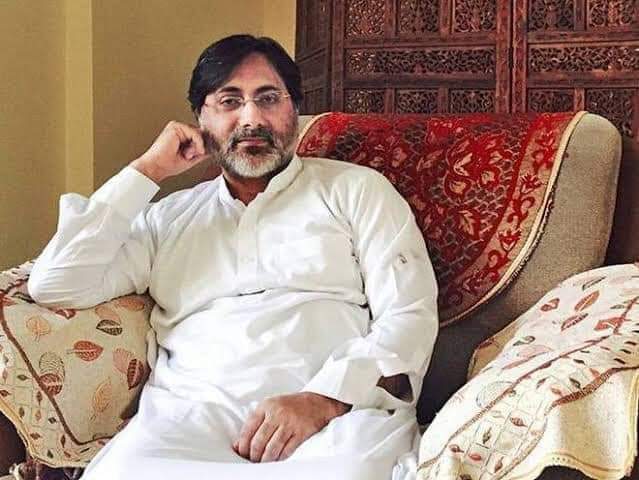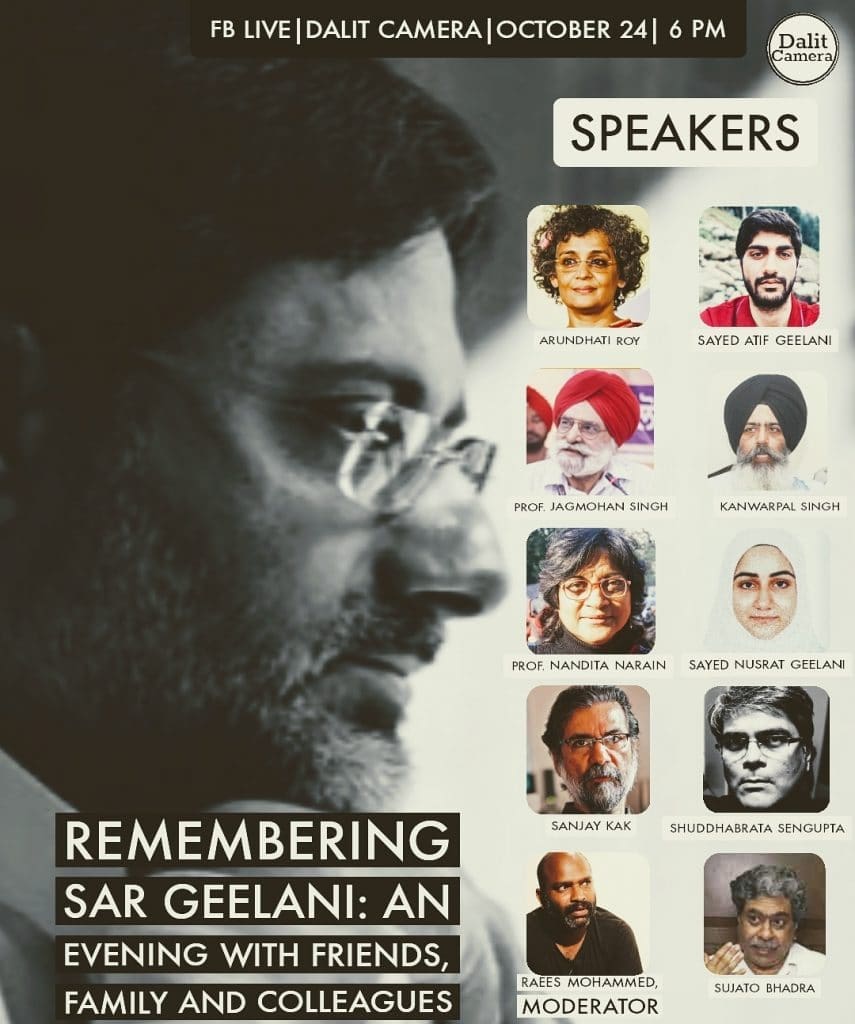
On the first death anniversary of professor Syed Abdul Rahman Geelani, an online memorial, held by the Dalit Camera, resonated with the aura of his life. Friends, colleagues, and family of the late professor and human rights activist came together and shared living memories of their time spent with Geelani, and the impact of the activism, that made Geelani who he was.
Geelani was first accused of being one of the conspirators in the Parliament attack of 2001 and put behind bars. It was only in 2003 that he was acquitted of the charges based on a lack of evidence in court. Released from jail, “Geelani was warned by his lawyer not to expose himself too much and had survived two attempts of assassination. He still went out and stood for what is right.” says former colleague, and activist Prof. Nandita Narain.
Geelani’s family, friends, and colleagues define him as the epitome of strength, generosity, and humility. Remnants of his video interviews were played at the beginning of the event, where he can be seen fearlessly defending the human rights of the oppressed, the people of Kashmir and particularly of Afzal Guru’s “judicial murder,.. that he was made the scapegoat to satisfy the collective conscience of …the barbaric elements of the society,” Geelani is seen advocating in his conversations.
Recollecting memories of Geelani, Raees Mohammed, founder editor of Dalit Camera and the moderator of the event stated that his loss is monumental, and although his physical presence will be missed, his memories will be cherished forever. He expressed grief over the lack of time and destiny that never allowed them to record Geelani’s past, his roots, and his life in the form of a biography.
Professor Jagmohan Singh, another friend, and colleague, initially embarked on a journey with Geelani as a Human rights activist in the formation of the Committee for the Protection of Rights of Detinues.
Singh, a former Professor at Punjab Agricultural University and Bhagat Singh’s nephew, remarked, “Silently, he kept working, his smile was omnipresent and so was his determination. 7 bullets in his body, a foisted case, and uninterrupted incarcerations could not prevent his movement across the country to stand for people’s rights and also to unequivocally uphold the right to self-determination of the people of Kashmir. He was a friend of the Sikhs and the Sikh struggle.”
Atif, Geelani’s son, described his father’s image as a ‘calm river’ who would quietly continue his work to serve other people, and as an outspoken man of courage who stood against the abuses of human rights and other forms of oppression.
“He was the life of every gathering. Life won’t ever be the same, it goes on but our life is bereft of its soul,” says Nusrat, Geelani’s daughter who is an advocate.
Geelani was an educator, human rights activist, and a man of his words, who would help people across spectrums. Envisaging his legacy Prof. Narain described her memory of SAR Geelani as a personification of solidarity that cut across different boundaries. “We have to come together instead of fighting our battles all to ourselves,” she said.
Prof. Narain dedicated Faiz Ahmed Faiz’s revolutionary poem ‘Aaj bazaar mein pa bajola Chalo’ to Geelani’s memory and sung it at the live event.
Speaking of Geelani’s untimely demise Human Rights Activist Sujato Bhadra calls it a very personal loss. “Public opinion was created in a presumptuous judgment that must and we have been contesting”, comments Bhadra recalling the intricacies of the case. Geelani was the president of the Committee for the Release of Political Prisoners (CRPP), to which Bhadra shares membership and is one of the vice presidents of the committee.
Friends and colleagues praised his intersectional and cross-sectional approach, where he never hesitated to stand
unambiguously for injustices across spectrums, faiths and castes, despite being centrally identified by his Kashmiri identity.
Arundhati Roy, an award-winning author and activist, expressed that her admiration for Geelani stemmed from the fact that he never hesitated to stand in solidarity with the displaced Adivasis and those facing injustice without compromising his values as a Kashmiri and a Muslim.


“Martin Luther King was assassinated because he made the connection between racism, war and capitalism…” this is what ” …the elites, the establishment, and the state of this country fear the most,”, she says, “..the crosshair of solidarities that should be made, the solidarities of people who are being oppressed by a particular vision.”
The investigation of the parliament attack and the trials of the accused were actively challenged by Roy on many occasions.
“We cannot ever forget. One day this story will be told in the way it should have been told, one day we will triumph and this very oppressive narrative will be cracked open and when it is exposed to the rot that it is, one of the angels that helped to crack open this shell will be SAR Geelani.”, says Roy, putting the truth behind the legality of the 2001 Parliament attack case at the forefront and the detrimental consequences of the toxic media culture, that was and is still infinitely responsible for maligning the reputation of individuals based on public opinion and no evidence.
“Till this date, we do not know what that attack was. We know that Afzal pointed his fingers at Davinder Singh, and spoke about how he was tortured.” She also spoke about the intricacies of the death of Guru being a “judicial murder committed by the state, as stated (by the court) to satisfy the collective conscience of the society (even with the lack of evidence).”
On this memorial, Film-maker Sanjay Kak, remembers Geelani’s aura as a drawing force that drove him back to Kashmir in a profound way. Kak recalls, Geelani as fundamentally a very compassionate person, and that his generosity derived from an exceptional amount of courage, which explained the dignity with which he saw himself through the ordeal of the case of the parliamentary attack, and the dignity and intensity with which he dealt with the aftermath.
Shuddhabrata Sengupta, artist and curator, dedicated a piece to the memory of his friend SAR Geelani on what would have been Geelani’s 51st birthday (August 14, 2020), which he shared live at the event.
“He was a man of few words and many silences. He taught in a difficult language and searched for much of his adult life for the words that could carve a space for freedom, even when language itself had been debased and emptied of meaning.”
Sengupta reminisced that only occasionally would Geelani talk to him about the violence he had endured in jail and once revealed to Sengupta that it was difficult for him to write or type because of the injuries to his wrists and fingers.
The conversations between Sengupta and Geelani revolved around a wide range of subjects, such as politics, literature, and Arabic poetry, and they shared a common love for the poetry of Mahmoud Darwish, the great poet of Palestine.
Collectively, friends, family, and colleagues recall his resilience, demeanor, and humbleness, and that his encounters with the media and prejudiced experiences with people around him never made him bitter.
Geelani passed away on 24 October 2019, due to a cardiac arrest.
Nusrat recalls with a heavy heart, the horrors of his demise, says, “It is very difficult to speak about him, and to adjust to his absence. His death is a mystery to us, we were told that he had a cardiac arrest, but nothing was written on the reports.” The cause of his death according to Nusrat was not written on his autopsy report. The report suggested that his samples had been sent to the forensic lab.
“After his death, I met many people, who had spent time with him at Tihar jail. They recalled their memory of Geelani, as a courageous man who taught the prisoners to live a life of dignity and to stand for one’s rights in a lawless place like jail,” recalls Atif.
Prof Jagmohan Singh believes that “The last tribute that we can pay to the memory of SAR is that the rights of the people of Kashmir should again be on the discussion table and part of the narrative. We need to invigorate the movement for the protection of the rights of the political detinues, and prisoners of conscience. That I believe would be the best way to honor our friendship with the man who spent his entire life spending his life for others.”



